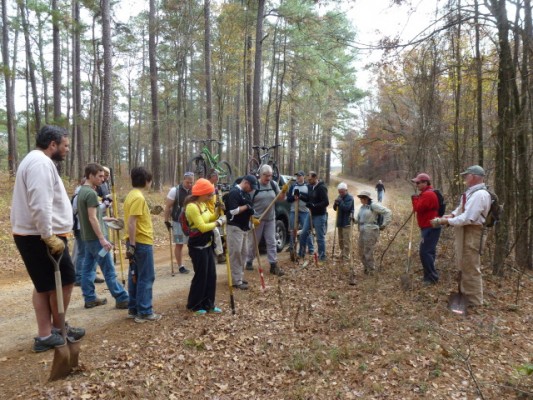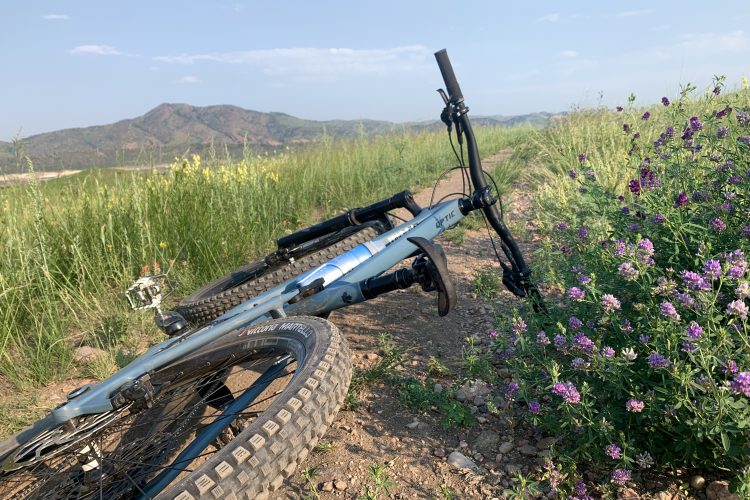This is the second half of an article examining the effects of wet weather racing and the policies that need to be in place to protect trails from extensive damage. Read Part 1 right here.
Plan B – The Other Plan
If the trails are too wet to handle the abuse from a race, Plan B is what a race promoter will do in order to compensate. This is where trouble arises, because often there isn’t a Plan B in place.
Creating a backup plan should be part of the early race planning process, because if there is no good Plan B and the weather turns sour, then the race probably shouldn’t happen at all.
There are a lot of options for Plan B. Rescheduling works well for smaller, mostly local races – simply push the event back a week.
For bigger events rescheduling may not be an option, and if a race does have to be rescheduled the event promoter needs a well-defined plan of how racers’ entry fees will be handled. Racers also need to be aware of that policy before laying down their money. Most races open pre-registration (and often sell out) months before the event. At that time, there’s no way of knowing what the weather will be like on race day. When race day gets near and is preceded by a week of rain, and the race is postponed, some of the pre-registered riders won’t be able to make the new date. Do they get a full or partial refund?
If a race is planned, and then canceled due to rain, the promoter is still out money. All sorts of expenses are paid for prior to the race happening (permits, insurance, supplies, etc.) and often aren’t refundable if the race doesn’t run. So should the promoter simply take the hit and give everyone a full refund? Gambling that much money based on fickle weather patterns is risky, no matter who you are.
Another option is a partial refund: the promoter keeps enough of the race fees to cover their expenses (so they break even), and then everyone gets a pro-rated refund.
Or, there could be no refunds offered. For an advocacy organization, a big event may be the major source of their income–income which is used to buy tools and supplies to maintain the trails in their area. The money doesn’t go into anyone’s pocket–it goes back to the trails. In such a situation, denying refunds, and telling racers to consider it a donation to the club, isn’t a terrible option.
Our club hosted a 13hr race a few years ago, coincidentally at Hickory Knob State Park, and it was rained out. The club had a well-defined rain policy that was outlined on the event website, and they followed it. The race was postponed a week. When they weren’t able to make the rain date, several racers got very pissed off about not getting a refund, and very vocal about their frustration. But, when they signed up, those racers agreed to that rain policy, so their frustration when said policy was followed was completely groundless. The promotor needs to be ready for this type of response.
An alternate course is a great option, if available. A race held out in a forest could have an alternate course that stays on gravel roads and double track, and off the singletrack. But a race held in an urban area may not have an alternate course available, or at least not one anyone would want to ride. A national championship mountain bike race shouldn’t take place on paved roads, know what I mean?
Plan C – The Other Other Plan
What happens if the weather changes during the event, and the trail is no longer able to withstand the demands from the race? This could happen if, say, there is a torrential downpour five hours into a 12-hour race. For just such a situation, there should also be a Plan C in place – a plan to protect the trail if conditions change during the event.
Generally, stopping the race early is the only option. Putting everyone onto an alternate route usually isn’t possible, unless it’s a single loop or point-to-point race and the change can take place ahead of the race leaders. Everyone needs to ride the same course, otherwise it’s an unfair competition.
The 13hr race our club hosted at HKSP, which had already been postponed once due to rain, had a Plan C situation arise during the middle of the race. Heavy rain set in about an hour or two after the starting gun went off, and around hour three it was clear the trail was taking a substantial hit. So, the race was stopped early. Racers were okay with the decision, as they could see riders coming into the finish area coated in mud and knew the trail was being damaged. There were no complaints. Similarly, the disastrous 2010 Fools Gold was stopped early when the pro race leaders finished their first lap and begged the promoter to stop the event, which they did.
Making The Call – Who’s Responsible?
Who’s job is it to say “no” and stop, postpone, or alter a race? The land manager? The race promoter? Another way of asking the question is, who’s to blame when a race isn’t canceled, and that decision results in substantial trail damage?
Answer: it’s everyone’s responsibility, and everyone is to blame, including the racers. This is tough. No one wants to cancel a race. A lot of planning and preparation took place for months leading up to the event. Racers have been training, spent a lot of money to enter the event, and traveled to get there.
While in the ideal world the racers would be conscientious enough to not race if the conditions are bad, the truth is if the race isn’t canceled, most riders will still go out and race anyways. I know, because I’ve done it. I was at the 2010 Fools Gold and spent 6.5hrs riding through peanut butter-thick mud in the rain before finally quitting and taking gravel roads back to the finish area. I knew it would be muddy, but I paid $100 to race, took time off of work to travel, and had been riding a ton for training–I felt like I was too invested to walk away. It’s a mistake I hope to never make again. I vastly underestimated just how muddy the course would be, and the repairs to my bike more than doubled my total “race expense”… and I got off easy.
All parties involved need to agree to work together to make the decision to cancel. The land manager gets the ultimate say, but the race promoter should take it upon themselves to stop the race if needed. If there’s a volunteer group who maintains the trail, they need to be a part of that conversation, too.
The Take Away
As I said earlier, the point of this article isn’t to place blame or point fingers at anyone, because most of us are guilty of racing or riding when we shouldn’t have. Hopefully this article has shed some light on the many different factors that need to be considered when planning a race, and shows how important a well-defined plan truly is. It’s all about weighing the risks against the rewards, and trying to minimize the negative side.
A mountain bike race is great family fun! It can bring people of all sorts of backgrounds together for a day or weekend of fun, bring visitors to town to boost the local economy, raise money for a cause, and improve the trail system it uses. But there is always the risk of damaging the trail, preventing other races from happening there ever again, and potentially having the trail shut down for good. Trails are resources that should be managed with an eye towards the future, and that may mean canceling a race one year so it can continue for years to come. And finally, we should all accept the responsibility and sit a race out when it’s the right thing to do, not just when the promoter or land manager cancels the event.
When the weather is good and the trails are dry, I’ll see you on the start line!
Your Turn: What’s your take on wet weather racing? Who do you think has the ultimate responsibility for canceling a race or enacting a backup plan due to inclement weather?
























10 Comments
May 29, 2013
Sure, we'd like to think that race organizers have certain conservation and trail ethics, but even if they do, the amount of time and money that they've invested in the event before it even takes place could override any normal reservations they would have about wet trails.
I honestly think that if a race is NOT going to take place, it can't be the racers or the organizer that is on the hook to make the call, because chances are they'll make the wrong one. I think for something to actually get canceled, the land manager and/or the local trail care group needs to be involved in the decision-making and need to be a part of the conversation, even before the rain becomes a factor.
May 29, 2013
May 29, 2013
May 29, 2013
May 29, 2013
May 30, 2013
This is akin to say, a homeowners association fee that is used for maintenance and repair. Where I live, we have a road maintenance fee (I am somewhat rural and the road is private). This was recently used to repave the road which serves 26 homes.
Obviously this would have to apply across the board and for all sanctioned races. There would also need to be some recognized (and trusted) organization to handle it. If a trail were damaged then a claim
would be filed and the trail repaired.
This doesn't address the reason for the trail damage but would go a long way in keeping the land owners/managers happy and the MTB community "respectable".
May 30, 2013
May 29, 2013
May 29, 2013
I don't think most racers would be willing to just lose their entry fee entirely though, not to a for-profit race promoter at least. Like I said, people were pissed when they couldn't make the rain date for the race my club put on, and that race was to raise money for the local SORBA chapter.
Jun 1, 2013
That will help focus attention of event promoters on doing the right thing. $20k guarantee should be cheap to buy.
For clubs that do ongoing local volunteer maintenance, that requirement should be waived as they are contributing in kind..